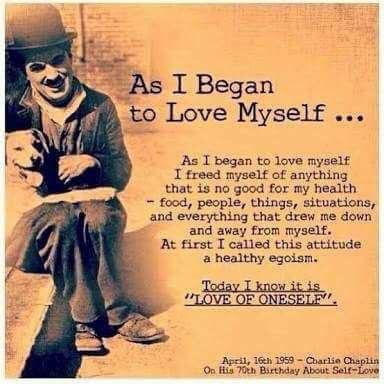<本当の自分> <エゴ>
マインドフルネス(念) 失念
集中 分散
↓ ↓
理解 誤解
洞察 思考
↓ ↓
愛 執着(愛着)、依存症
思いやり 悪意
↓ ↓
平和 怒り、憎しみ、抑うつ
希望 絶望
(協調) (競争、比較)
↓ ↓
喜び 痛み
幸せ 苦しみ
【ヒント】
1. 呼吸しているのは誰ですか?熟睡している時も呼吸しています。あなたは意識して呼吸していませんよね?呼吸しているのが「本当の自分」です。
2. 考えているのは誰ですか?熟睡している時は考えていません。あなたは意識して考えていますよね?考えているのが「エゴ」です。
3. 考えているのが本当の自分だと勘違いしていませんか?もしそうなら、脳が本当の自分になってしまいます。本当の自分は考えません。脳は本当の自分ではありません。
4. 考えるのを止めた瞬間に洞察を得たことがありますか?もしあれば、それが本当の自分です。洞察は取りに行くものではなく、何もしなくても自然に入ってくるものです。
5. 生命の奇跡に触れていますか?生命の奇跡に触れると喜びと幸せが湧きだしてきます。幼子のように。考えていると生命の奇跡に触れることはできません。
6. 現実を見ていると勘違いしていませんか?考えている限り目に映るものは全て幻想です。洞察を通してしか現実に触れることはできません。
7. 目に映る世界はあなたの心の投影であることに気付いていますか?あなたの心をあなたは見ているのです。心を止めると、穏やかな心が鏡の如く現実を反射できます。
8. 苦しみを相手のせいにしていませんか?それでは何も解決しません。苦しみの原因は全て自分の心の中の障害にあるのですから。
(参考)
https://www.slideshare.net/compassion5151/3-46874436
https://www.amazon.co.jp/dp/B012YZBHHS
http://compassion5151.blogspot.jp/2017/05/blog-post_25.html
【ヒント】
1. 呼吸しているのは誰ですか?熟睡している時も呼吸しています。あなたは意識して呼吸していませんよね?呼吸しているのが「本当の自分」です。
2. 考えているのは誰ですか?熟睡している時は考えていません。あなたは意識して考えていますよね?考えているのが「エゴ」です。
3. 考えているのが本当の自分だと勘違いしていませんか?もしそうなら、脳が本当の自分になってしまいます。本当の自分は考えません。脳は本当の自分ではありません。
4. 考えるのを止めた瞬間に洞察を得たことがありますか?もしあれば、それが本当の自分です。洞察は取りに行くものではなく、何もしなくても自然に入ってくるものです。
5. 生命の奇跡に触れていますか?生命の奇跡に触れると喜びと幸せが湧きだしてきます。幼子のように。考えていると生命の奇跡に触れることはできません。
6. 現実を見ていると勘違いしていませんか?考えている限り目に映るものは全て幻想です。洞察を通してしか現実に触れることはできません。
7. 目に映る世界はあなたの心の投影であることに気付いていますか?あなたの心をあなたは見ているのです。心を止めると、穏やかな心が鏡の如く現実を反射できます。
8. 苦しみを相手のせいにしていませんか?それでは何も解決しません。苦しみの原因は全て自分の心の中の障害にあるのですから。
(参考)
https://www.slideshare.net/compassion5151/3-46874436
https://www.amazon.co.jp/dp/B012YZBHHS
http://compassion5151.blogspot.jp/2017/05/blog-post_25.html
<True self> <Ego>
Mindfulness Forgetfulness
Concentration Dispersion
↓ ↓
Understanding Misunderstanding
Insight Thought
↓ ↓
Love Attachment, Addiction
Compassion Ill-will
↓ ↓
Peace Anger, Hatred, Depression
Hope Despair
(Cooperation) (Competition, Comparison)
↓ ↓
Joy Pain
Happiness Suffering
【Hints】
1. Who is breathing? You are breathing even in your deep-sleep state. You are not breathing consciously, are you? The breather is 'True self'.
2. Who is thinking? You are not thinking in your deep-sleep state. You are breathing consciously, aren't you? The thinker is 'Ego'.
3. Don't you misunderstand that the thinker is 'True self', do you? If so, your brain must be 'True self'. 'True self' never thinks. Your brain is not 'True self'.
4. Have you ever attained insight right after stopping the thinking? If yes, that is 'True self'. Insight is something which enters into you naturally, not something to take.
5. Are you touching the wonders of life? You can generate joy and happiness when you touch the wonders of life. Like a child. You can never touch the wonders of life while thinking.
6. Don't you misunderstand that you see the reality, do you? As long as you think, everything you see is an illusion. You can touch the reality only through insight.
7. Are you aware that everything you see is the projection of your mind? You are watching your mind. If you stop your mind, your calm mind can reflect the reality like a mirror.
8. Your suffering is because of the other's attitudes? If you think so, nothing will be solved. That's because your suffering is because of obstacles in your mind.
【Hints】
1. Who is breathing? You are breathing even in your deep-sleep state. You are not breathing consciously, are you? The breather is 'True self'.
2. Who is thinking? You are not thinking in your deep-sleep state. You are breathing consciously, aren't you? The thinker is 'Ego'.
3. Don't you misunderstand that the thinker is 'True self', do you? If so, your brain must be 'True self'. 'True self' never thinks. Your brain is not 'True self'.
4. Have you ever attained insight right after stopping the thinking? If yes, that is 'True self'. Insight is something which enters into you naturally, not something to take.
5. Are you touching the wonders of life? You can generate joy and happiness when you touch the wonders of life. Like a child. You can never touch the wonders of life while thinking.
6. Don't you misunderstand that you see the reality, do you? As long as you think, everything you see is an illusion. You can touch the reality only through insight.
7. Are you aware that everything you see is the projection of your mind? You are watching your mind. If you stop your mind, your calm mind can reflect the reality like a mirror.
8. Your suffering is because of the other's attitudes? If you think so, nothing will be solved. That's because your suffering is because of obstacles in your mind.
Charlie Chaplin





